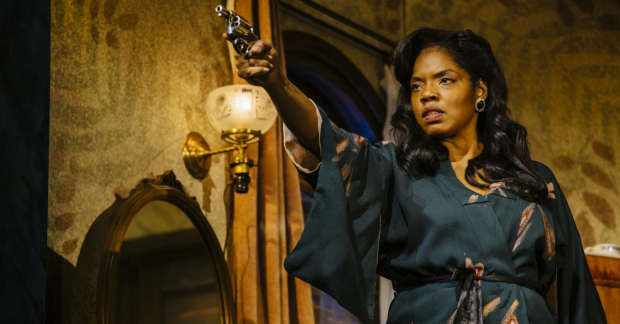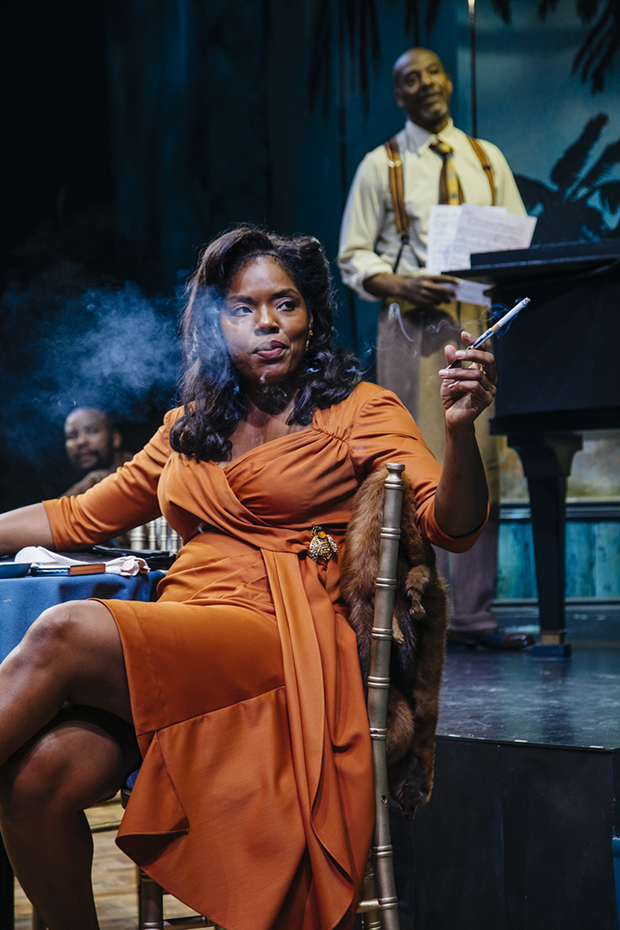Interview: The Chi Star Tyla Abercrumbie Goes Back to the '40s in Paradise Blue
Abercrumbie leads the Los Angeles production of Dominique Morisseau’s noir-style drama.
Close your eyes and go way back, back to a smoky, jazz-filled club in 1949 Detroit. Blue, the owner of the club, is trying to make the hard decision of whether he should sell his club or hold on through gentrification.
That's the plot of Paradise Blue written by Dominique Morisseau and currently running at the Geffen Playhouse in Los Angeles through December 12. TheaterMania chatted with its star, Tyla Abercrumbie, during rehearsals to discuss how she's balancing this role, starring in Showtime's The Chi, and rehearsals for the play that she herself wrote, which is coming to Chicago's TimeLine Theatre Company beginning January 19.

(© Jeff Lorch)
This conversation has been condensed and edited for clarity.
You're doing Paradise Blue at the Geffen. Did you know anyone involved with this production prior to signing on to the project?
No, I did not. When I got a call in Chicago from my agents to check my availability and interest, I was excited. I love [Dominique Morisseau's] writing. I love her storytelling. I love this character that I'm playing, Silver. I was excited just based on those facts alone.
Then I stumbled across that John Jelkes was in the show and I know John from Chicago. We both were in a play at the Goodman. I also understudied another play by August Wilson that he did at the Goodman. So I was excited to know that I would get the opportunity to play across from him.
Tell me a little bit about your character, Silver.
Silver is this wonderfully mysterious character that shows up in Black Bottom, Detroit, which is their jazz paradise, sort of like a jazz mecca of the 1940s. She enters this kind of community of people who move and understand each other in a certain rhythm but she's so out of rhythm with them.
Because of her ability to be alone, empowered, and unafraid to deal as a woman at that time, she's also got plans. She's not just there to start over. She has serious plans and she's kind of willing to do a whole lot, almost anything to achieve them. So she's very exciting.
Were you one of those people who watched old movies as research, especially for the nightclub scenes?
Yes, when I was a girl dreaming of becoming an actor and beautiful woman out in the world. I had watched so many of them I thought that's what it was going to look like when I started going out to dinner.
Everyone had on tuxedos and formal gowns. And the guys all had on hats and it was just this energy that was so seductive. I love the bar scenes. I love the language, how the women were empowered. Then of course I look at the acting. I love stars like Barbara Stanwyck, Bette Davis, Humphrey Bogart, Joan Crawford. I love how they turned to the camera. It was just great.

(© Jeff Lorch)
Now you're going from this into another play, Relentless in Chicago? Did you write it?
This is my play that I wrote. I'm not actually going to be in it, but when I return to Chicago, they will have started rehearsals. My play is a period piece about 1919/1920 Black Victorians. There are segments in our history where Black Americans were doing tremendously well and consequences caused that to be wiped out, changed and distorted. 1919 was a very affluent time for some [Black] Americans and that's what my play is based on.
You've been on The Chi on Showtime for four seasons now, for people who know you from the show. How has your character Nina grown and how have you grown as an actor in those four seasons?
The character Nina has grown not just from starting out as Keisha and Kevin's mom (Birgundi Baker and Alex Hibbert) but having to be a part of trying to help her children navigate the traumas they are experiencing. Then at one point I was married to a woman and then remarried to another woman, so that's been very significant. With my child missing in season three, I feel like Nina went from this mother trying to make sure her kids were OK to showing the character navigating life not just for her kids but for herself.
For me, what was so great is this is the first time I've been on a series for four seasons. I've done characters before but they are usually the characters that come in and have something to say but are not significant to the story. In this instance, my character is so significant that this allows me to spend a lot more time on sets and learn how to navigate working out of sequence, navigate working emotional scenes before the actual trauma has supposedly happened.
I know you've been asked this before, but how are you doing all of this? How do you find the time for this when you're also a lead in a series?
You navigate it. They're all so important to me. And I tell people that I know that I'm married to my work. It's my first love. Anybody willing to be second to that is a trouper. When you decide or accept that it means so much to you, you find the time.
I get caught up in what I love, which is documentaries, you know, I like to call them "the murder channel," you know, ID Channel (Investigation Discovery). Why did they start making those? I know everybody that watches them is completely addicted to them.
True Crime.
When I don't want to do that I watch a good old movie and I make sure I do my exercise and take mental health time for myself.
In Chicago, I like to work from about 11 at night until six in the morning. And then I go to sleep until noon and I'm ready to work. I think our brains just click at night. And we have wonderful energy and thoughts at night.









